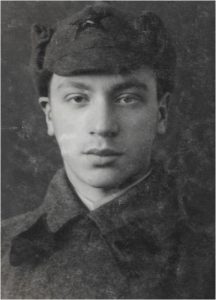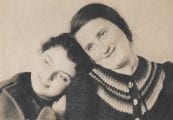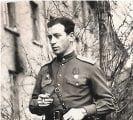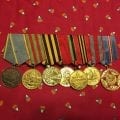- Local Survivor registry
- DAVID KOGAN
- Local Survivor registry
- DAVID KOGAN
Survivor Profile

DAVID
KOGAN
(1921 - 1984)
PRE-WAR NAME:
DAVID KOGAN
DAVID KOGAN
PLACE OF BIRTH:
ODESSA, SOVIET RUSSIA
ODESSA, SOVIET RUSSIA
DATE OF BIRTH:
SEPTEMBER 26, 1921
SEPTEMBER 26, 1921
LOCATION(s) BEFORE THE WAR:
MOSCOW, RUSSIA
MOSCOW, RUSSIA
LOCATION(s) DURING THE WAR:
SOVIET ARMY
SOVIET ARMY
STATUS:
SURVIVOR
SURVIVOR
RELATED PERSON(S):
RAISA VOLKOVA - Spouse (Deceased),
ELENA VOLKOVA - Daughter,
NATALIA VOLKOVA BLACK - Granddaughter,
DINA, JOLIE Great-Grandchildren
-
BIOGRAPHY by elena volkova
My father, David Kogan was born on September 26, 1921 in Odessa. His family lived in Moscow. In 1939 he went to the Army. In 1941 he was among defenders of Moscow and went all through the war as a soldier, a tank driver and then an officer. He was wounded many times. In 1944 he was sent to Moscow to recover and there he met his old school friends. There were no telephones, so he went and knocked on doors to find his friends and he met my mother. In one month, they got married. And on May 15, 1945, I was born. My father got many medals during the war from the army. After the war, he wanted to leave the Soviet Army but was not allowed to. He had to stay in the Army until 1955. After that, he returned to Moscow, got a job and lived with his family. He died in 1984.
Elena Volkova Explains the Legacy of her Father’s Medals
My dad had a lot of medals and the Order of Red Star. By Russian law these medals and order cannot be taken out of the country as they are our cultural treasure. But how could I leave them there? They are part of our family history and I wanted my grandchildren to know it and to be proud of them. But it took me almost a year to get them out. All the bureaucracies to get the permission from the minister of culture himself. And even with his permission, no one knew whether customs would allow it. So my friends came with me, just in case, to take the medals if they did not allow me to take them with me. So now my granddaughters know the stories and they will have the medals. My granddaughters know a lot of our family history, about their ancestors, and about our country.
-
SURVIVOR INTERVIEW:
DAVID KOGAN INTERVIEW WITH ELENA VOLKOVA, DAUGHTER
November 30, 2016
Location: Volkova Residence
Interviewer: Nancy Gorrell
Q: What would you like to share about your father’s background?
My father was born on September 26, 1921 in Odessa. When he was four or five his family moved to Moscow. His father was a specialist in agriculture. He got a job in the Ministry of Agriculture. They were educated Jews. Before the revolution, the chances for education for Jews were limited. My grandfather got his education mostly after the revolution although he started before. My father went to school in Moscow and graduated high school in 1939 and then went to the University for engineering until Sept 18, 1939, when World War II started. When Hitler invaded Poland, all the boys by Stalin’s orders were taken into the army. My father had studied just eighteen days.
Q: What was your mother’s name?
Her name was Raisa Volkova, and she was born in Kiev on March 11, 1920. My mom was in the same graduation class as my father. They knew each other since middle school.Q: Did your father or family experience any anti-Semitism growing up and going to school in Moscow?
Of course, there was anti-Semitism before the war and before the Revolution. There were pogroms. Both my mothers and father’s families suffered from that. Jews could not live in big cities; most of them lived just in shtetls. My grandfather’s brother left for America in 1905. My grandma’s brother left for Palestine to study because he could not enter any university in Russia. But officially, all the limits for Jews disappeared after the Revolution in 1917. Jews could study; they could live everywhere. So in 20s and 30s anti-Semitism was more like just slurs and jokes about Jews; there were no rules against admitting Jews to the universities or jobs. But anti-Semitism started again after the war and especially in 1950s and later.
Q: What did your father tell you about his pre-war experiences?
Before the army, my dad was a bookworm. He was not ready for war or the army. The army leader who trained him humiliated the new army boys. He made them do physical exercises to become strong and taught them how to be soldiers. The army leader was not an educated person and these young boys laughed at him and hated him. But years later my father told me he wanted to thank that uneducated army man who taught him how to survive in war. He never saw him again to thank him.
Q: What stories did your father tell you about his defending Moscow?
My father wasn’t in the battles until 1941 when he was older. On June 22, 1941 Hitler invaded Russia and my father had to defend Moscow. So he fought the Nazis, defending Moscow in very active battles, and very soon his unit was surrounded by them. Most soldiers were killed and he stayed alone on the road when he heard the sound of motorcycles. He didn’t know what army it was, so he decided to hide in the ditch and soon the column of Nazi motor cycles passed him by, and he was sure they would notice and kill him. But he survived and soon he found a Russian soviet military unit. But they said, “You, the Jew, came from the place where the Nazis were and survived? You are a spy.” They thought this because it was impossible to believe that a Jew came alive from a place that the Nazis were. So they took him to be killed the next morning, you know, the KGB, but in the night he managed to escape and some days later he found his own unit where they knew him. He escaped death.
Q: It was a miracle?
Yes, a miracle, but they were so naïve in those days.
Q: How so?
It was the first winter and it was very cold. They suffered so from the cold and starvation. Then there were times when they were surrounded by the Nazis, and they had to hide in swamps and they had to drink swamp water. He realized that he was going to die anyway, so he wanted to die as a communist saving his country. Later, he understood this was just his naivete.Q: What do you mean by your father’s naivete?
At that time they believed in communism and Stalin. Even though there were tragedies of 1930s when thousands people were arrested by KGB, people still believed in Stalin and were shouting his name during attacks.
Q: Did your father know about mass killings of Jews?
Mass killings of Jews were not near Moscow. Most of those killings were in the rural areas in the western regions. My father suffered all his life from bomb wounds but he survived the war.
Q: What happened to your father after that battle?
My dad was in the army that slowly went from Moscow through the Ukraine, Belorussia and Poland to Germany fighting the Nazis, and they finished their way in Berlin. At first he was a driver of a tank, then he became an officer in 1942, but he stayed in the same military unit. He was wounded many times. The last time he was wounded was the summer of 1944. After recovery, he met his old school friends. There were no telephones, so he went and knocked on doors to find his friends and he met my mom. In one month, they got married. Then he returned to the army. So by the spring of 1945, he was fighting against fascists in Germany.
Q: Did he liberate any camps?
No, his unit did not liberate any camps but they saw the camps (like Buchenwald) and helped people there but it was after liberation.
Q: How long did he serve in the Soviet army?
On May 15, 1945 I was born. My father got many medals during the war from the army. After the war he wanted to leave the army but was not allowed to. He had to stay in the army until 1955. After that he returned to Moscow and got a job and lived with his family.
Q: While your father was in the army, how did your mother and extended family survive?
My mother graduated from high school in 1939 and entered Moscow Medical University. By 1941 she finished two years of education and when the war started, she began working as a nurse in a hospital. The family lived in Moscow. But when the bombing started, all the family evacuated except my grandfather whose factory–bread factory, provided food for the army. My grandfather stayed. During 1936 and 1937, my grandfather was arrested under Stalin’s orders for being an American spy. Many Jews were arrested but many others too. My grandfather was sent to concentration camp in Kazakhstan but he never told us much about that. He was released and returned to Moscow to provide food for the army in 1941. His sister’s husband was a political man; in 1937 he was arrested and immediately killed, and his wife, my grandfather’s sister was arrested and sent to concentration camp. Their daughter who was ten was supposed to be sent to an orphanage. But her aunt kidnapped the child and took her to a different city and saved her from death.
Q: What happened to your mother?
My mother and her family fled to Tataria, a Republic, to the town of Mamadysh. They spent all the years of the war there. It was very hard with no electricity and running water. Heating was just a stove. It was a small village. My mother worked in the military hospital as a nurse and my grandmother worked on the farm. In 1943 they returned to Moscow and joined my grandfather. He worked there at the factory after the war. He built that bread factory in 1936 and worked there. He was an engineer.
Q: What was it like growing up in post-war Moscow? What were your memories?
I was born six days after the war was over. My cousin was born at the same time. It was not easy to have two infants. It was a very hard life. All food was rationed. It was impossible to find cloth for blankets for baby clothes. There was no running water even in Moscow. They bathed us in old suitcases. Well, I do not have much memory about the first years after the war. I just know about all these problems from my grandparents and parents. Our childhood, my cousin’s and mine, was very happy even though we did not have many toys or any luxury. But I do remember the fear in 1952, when Moscow Jewish doctors were arrested and there were rumors that all Moscow Jews would be deported to the Far East. The trains were ready. Only Stalin’s death saved us all. I do remember Stalin’s funeral when thousands people were killed. Luckily nobody of my family was there.
Q: Who survived in your immediate family?
Fortunately, my parents and grandparents all survived as well as my mother and father’s brothers, but my mother’s cousin, Jakov Krichevsky, died during the Leningrad blockade. He was a student of Leningrad University and stayed there so he was starving. All the food he got he shared with his fiancée and saved her life. After the war, she found his mother and told her how he died.
Q: Did you experience any anti-Semitism growing up in Moscow?
No, nothing serious in Moscow, but when I wanted to go to the University, I took exams and passed and did very well. Then, when I looked at the results, my name was not on the list. My grandfather and I went to check why. We thought there was a mistake and they told us, “We already took our limit of Jews.” This was 1962.
Q: Despite the anti-Semitism, how did you get your advanced education?
Instead, I entered the Pedagogical University for teaching and I became an elementary and English and biology teacher. I worked and taught in Moscow for 40 years at an English speaking school #1816. I met my husband in 1968. We had one child, Natalia, and then we divorced in 1973.
Q: Did the anti-Semitism continue?
Twenty-four years later, the anti-Semitism was still the same. It was 1986, but this time it was my daughter’s experience. Her teacher told her she should enter Moscow University and I told the teacher “We are Jews” and the teacher said, “I will try to find out if this is an issue,” and some days later the teacher called me to say, “You were right; she will not go there, there is no chance she will be admitted.” But most Jews got their education anyway, despite the anti-Semitism. All people in my in family; we got our education. My daughter went to a different university. I had a colleague that said to me: “Why do you talk about anti-Semitism? I got my education; you got your education. I have an apartment, you have the same one; I have a job and you have the same one. So where is anti-Semitism?” But then I asked her, “Is it ok if your son marries my daughter?” She said, “Over my dead body.” This is anti-Semitism.
Q: Why and when did you come to the United States?
First I came to the USA in 1993. It was really very interesting. An American teacher in River Falls, Wisconsin wanted to do a correspondence with a Russian teacher. He had many questions about our school, about our teaching, so we started to write each other via e-mail. Then we started some telecommunication projects. He was an elementary teacher and each of his students started a story, and my students finished the story. He got a Christa McAuliffe Fellowship and could come to Moscow for three months to work at my school. And after that I got an invitation to come to their school to work there. Since then, we stayed friends. He named his daughter after me. That’s how I got to America first.
Q: What happened next?
And then I went there to organize summer school for American kids, and American teachers came to Moscow for summer school with my students. The exchange continued for several years. And then my daughter got a fellowship for graduate school in NYC at the New School for two years, and there she met her future husband. After getting a Masters Degree, she had to return to Moscow on the condition of her fellowship. She returned to Moscow for two years and then she returned to US to be with her husband. Her daughter was born in Moscow. Since 2005, she lives here. And then we decided I should move to US because Natalia was my only child, and I wanted to be with her. I moved to New Jersey in 2007. Natalia works for Jewish Federation in East Brunswick, New Jersey. And I have two grandchildren, Dina and Jolie. Mostly, I have been full time grandmother.Q: Did you have difficulty coming to America?
We applied in 2006 and I got permission a year later. My daughter and her husband had to vouch for me, and we had to get an affidavit. Before 1990s Russia didn’t want to let the Jews go. They had to pay back to the government when they left whatever their education cost, whatever their apartments costs (all apartments belonged to the government) and they had to pay for restoration of their apartments. They could only take one suitcase each—no money or valuables could be taken out of the country. When I left, by that time in 2007, it wasn’t a problem. I could take whatever I wanted except my father’s army medals.
Q: Why were your father’s Soviet Army medals so important to you?
My dad had a lot of medals and the Order of Red Star. By Russian law these medals and order cannot be taken out of the country as they are our cultural treasure. But how could I leave them there? They are part of our family history and I wanted my grandchildren to know it and to be proud of them. But it took me almost a year to get them out. All the bureaucracies to get the permission from the minister of culture himself. And even with his permission, no one knew whether customs would allow it. So my friends came with me, just in case, to take the medals if they did not allow me to take them with me. So now my granddaughters know the stories and they will have the medals. My granddaughters know a lot of our family history, about their ancestors, and about our country.
-
Sources and Credits:
Credits:
SSBJCC Survivor Registry Interview by Nancy Gorrell, November 30, 2016; Digital historic and family photographs and documents; Digital reproduction of family heirlooms (wartime medals, letters, pipe) donated by Elena Volkova








